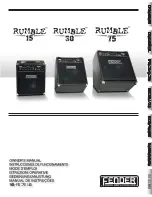
Chapter 2
Basics 57
SR865A DSP Lock-in Amplifier
Inductive coupling
An ac current in a nearby piece of apparatus can couple to the experiment via a magnetic
field. A changing current in a nearby circuit gives rise to a changing magnetic field which
induces an emf (dØ
B
/dt) in the loop connecting the detector to the experiment. This is like
a transformer with the experiment
–
detector loop as the secondary winding.
Cures for inductively coupled noise include:
1) Removing or turning off the interfering noise source.
2) Reduce the area of the pick-up loop by using twisted pairs or coaxial cables, or
even twisting the 2 coaxial cables used in differential connections.
3) Using magnetic shielding to prevent the magnetic field from crossing the area of
the experiment.
4) Measuring currents, not voltages, from high impedance detectors.
Resistive coupling or ground loops
Currents flowing through the ground connections can give rise to noise voltages. This is
especially a problem with reference frequency ground currents.
In this illustration, the detector is measuring the signal relative to a ground far from the
rest of the experiment. The experiment senses the detector signal plus the voltage due to
the noise source's ground return current passing through the finite resistance of the
ground between the experiment and the detector. The detector and the experiment are
grounded at different places which, in this case, are at different potentials.
Cures for ground loop problems include:
1) Grounding everything to the same physical point.
Summary of Contents for SR865A
Page 5: ...Safety and Preparation For Use iii SR865A DSP Lock in Amplifier...
Page 6: ...iv Safety and Preparation For Use SR865A DSP Lock in Amplifier...
Page 54: ...36 Getting Started Chapter 1 SR865A DSP Lock in Amplifier...
Page 118: ......
Page 172: ......
Page 186: ...168 The FFT Display Appendix B SR865A DSP Lock in Amplifier...
Page 192: ......
















































